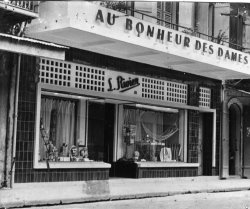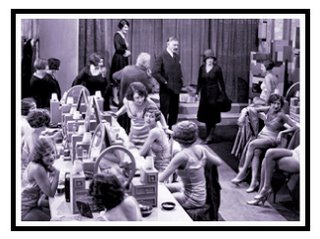Chaos and Control
 I really love days when there are significant contradictions, especially when they sort of hold up mirror images to each other. Sometimes I will kvetch and kvetch about something a friend does and then turn around and do it myself. I have never embraced a belief system that claims that the two greatest forces battling with each other are good and evil. Bunk. I believe that no more than the concepts of heaven and hell.
I really love days when there are significant contradictions, especially when they sort of hold up mirror images to each other. Sometimes I will kvetch and kvetch about something a friend does and then turn around and do it myself. I have never embraced a belief system that claims that the two greatest forces battling with each other are good and evil. Bunk. I believe that no more than the concepts of heaven and hell. To me, the driving energy of the universe is the constant tension between chaos and control. (That theme and the two-sided Kandinsky painting are what make Six Degrees of Separation one of my favorite movies.)
I experienced those contradictions today when, after realizing that something is seriously wrong with my cell phone, and it is a few months past warranty, I really wondered if it was worth the hassle of having it repaired . Or did I want to consider some kind of an upgrade? And I’ve been wanting a way to grab simple video clips and need some form of digital camera before investing in something more substantial next year. And, of course I travel a lot, and really need to access e-mail while waiting in airports, when not having enough time to do so on my laptop, etc., etc. So I felt the Treo 650 was really calling my name and decided that it was time to bite the bullet.
For the moment, I put that thought on hold this afternoon as I traipsed off to the 11th San Francisco Silent Film Festival (http://silentfilm.org/). This and the Berlin and Beyond Film Festival are my two favorite cinematic events in San Francisco and remind me that I stick around here for more than just the cool summers. But I let it sort of slip up on me and did not get tickets until the last minute. I’ve seen G.W. Pabt’s Pandora’s Box, a film that I have (like Metropolis) seen enough times that I can run each frame in my head. So I picked one at random, quickly reading the description, and forgetting what it was about until I got to the theatre.
Of course the reason these films so intrigue me is that they take me into the ultimate foreign cinema. – not just another language (in this case the subtitles were all in French with a woman verbally translating them into a mike in English while a jazz string quintet played musical accompaniment) or country or culture. They take you into another universe where the only verbalization is coming from the audience itself which heightens the collective experience.. The subtitles always feel like a poor summary or after thought, an awkward intervention.. In his introduction, the representative for the French consulate general of San Francisco apologized for mistakenly calling silent film mute film but that is actually a powerful observation of what makes it feel like you are learning a new way to communicate.
The film that followed, Au Bonheur des Dames is a 1930 French film directed by Julien Duvivier and starting Dita Parlo, best known as the inspiration for Madonna’s “character” on the album Erotica and star of the far better known L’atalante. Reportedly, this is only the second time the film has been screened in the U.S., making its premiere, albeit 76 years late, this May at the Seattle International Film Festival. I know French cinema mainly from the time of Rene Claire forward, so I have only recently started becoming interested in exploring the Gallic flicks of the same period that Germany was churning out expressionist masterpieces.
While the story advances with a few mild social critiques, the next hour focuses for the next hour on the trials of our little shop girl. It led met to believe I was seeing the French variation of the Clara Bow vehicle It that I saw at the festival last year which centered on a shop girl falling in love with the store manager.
girl. It led met to believe I was seeing the French variation of the Clara Bow vehicle It that I saw at the festival last year which centered on a shop girl falling in love with the store manager.
But then the whole film takes a very surprising series of detours in the final 20 minutes. Like Metropolis and King Vidor’s The Crowd, it comes down to a showdown between the honest and hard-working little guy and the evil, heartless corporate machine. But there is no resolution with a kindly handshake between labor and management that concluded Metropolis. In theory, there is a happy ending – the heroine is smiling, holding the man who has been her romantic interest, and she says both of their dreams have been fulfilled. But I got a weird, sick feeling during those final minutes.
I have to admit that after having had such a long and exhausting week, I found myself nodding off mid-way during the exposition scenes that established the romantic storyline. But I was riveted by the action of the final quarter of the film as it came to a conclusion with eerie relevance to our life in 2006. We long for the preservation of the decent, hand-made integrity of the local merchant, but the glistening jewels of the mega-retailers seduce us as we see all that is bigger, better, makes us look younger, sexier, thinner, more tanned.
As I stepped out into the mid-afternoon California sun after spending 120 minutes in the Jazz Age of Paris, I soaked in the experience with a couple of deep breaths before heading up Castro to Market to go to the Sprint store. Did I make eye contact with the guy wallowing in his own pee next to the tea shop asking for a dime, a quarter, any amount will do? I had no change, just a few ones and two twenties. Did I glance over at the Pottery Barn to the north and Diesel Jeans to the West and try to remember what used to be there? Did I think about the footsteps silenced on these streets over the past 25 years or try to think about the impact their absence has made on the lives in this city? This world? My world?
world? My world?
I walked across the street, watched the little wagon on my Wells Fargo VISA make a dustless ride across a scanner, gave the last four digits of my social security number and walked home feeling unclear about which side of the Kandinsky I had ended up on. The Treo will undoubtedly bring control to my chaos of contacts, e-mails, MP3s, photos, videos and text messages as I chart the globe hawking proposals to connect the richest people I the world with the wealthiest. But will I take time to look up from that screen that measures 2.5 inches diagonally to see the little dress making boutique being bulldozed across the street?




2 Comments:
It seems to me that seeing the universe in terms of "chaos and control" is just as problematic as "good and evil"; both world views fall prey to postmodern deconstuction in the same way.
That is to say, the terms "good" and "evil" are have different meanings for every individual; probably even different meanings to any one individual in different situations. The same is true of the terms "chaos" and "control". Both could easily exist at the same time, or neither.
Take entropy, for example. Sometimes the law of entropy is interpreted as "all things tend towards equillibrium", and sometimes it's interpreted as "all things tend towards chaos". If all the forces holding the all the particles in the universe suddenly came apart, there would be equillibrium in the universe, but chaos for us. Furthermore, since the universe has no perspective on whether or not its particles should be held together or not, to say that situation would be equilibrium for the universe is to impose a human gaze on a non-sentient system.
Really, then, to say that the world is a conflict between chaos and control is a battle of semantics rather than an actual representation of the universe.
Well, I guess my point -- probably not that well stated late in the day -- was that my problem with those who embrace a battle between good and evil is that they argue that they cannot coexist. To do so is to become or become a slave to the enemy. That's been the argument for war since the beginning of time, usually with both sides certain they are the good guys. Certainly that's the case with the current so-called War on Terror in which we'll never see a victory in which the President of Terror signs a peace accord.
The tension between chaos and control is very different, I would argue. I say that it is very much about coexistence and both are equally valuable and "good," if you will. Too much of either is dangerous, but when brought together artfully they can create the perfect meal, just as one does with sweet and sour in the same dish.
Post a Comment
<< Home